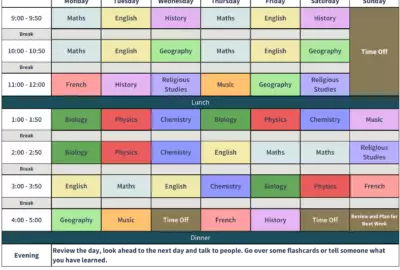
GCSE Maths is an important qualification that is required for university and many jobs beyond.
As such it demands thorough preparation and strategic revision. This guide aims to navigate the complexities of GCSE Maths revision, addressing common challenges faced by students and providing expert tips for success. As we delve into the intricacies of exam expectations, revision strategies, and last-minute tips, Ivy Education is your reliable secret weapon for all things GCSE preparation, offering comprehensive solutions to enhance academic performance.
Need more GCSE support?
10 Expert Tips to Master Your GCSE Maths Revision
Define Your Revision Objectives
Know the exam format and content so you know what to revise and when, this will ensure your revision is focused and efficient. Also prioritise revision so you cover your weakest areas first. We recommend starting with your weakest areas before moving onto a quick recap of your strengths and finally, revisiting those old weaknesses to ensure you are fresh on all content just before the exam.
Build Your Revision Plan
Once you know what to revise and when the exams are, it’s time to create a timetable. Be realistic about how much time you can commit to each subject without neglecting some self-care time. Schedule time to go outside, exercise, catch up with friends. Consider individual and group study sessions. Separate practice paper time from revision notes making time. Rewards are a great motivation!
Prioritise Self-Care
All the important things like sleeping, eating, exercise and keeping hydrated should be in your schedule! Revision should not come at the sacrifice of these things. Also, get creative with your self-care, include some activities with friends that allow you to share the ups and downs of this period. Remember, you’re not in this alone!
Review Your Notes
Spaced repetition is the secret to remembering just about anything. This means take some time to read through your notes every few days. Use iPhone apps such as Memrise or Quizlet to test yourself on formulas and use online interactive games such as MyMaths for adaptive practice. Using a variety of methods to revise, in small regular chunks will optimise your studying.
Practise a Lot
Unlike other subjects, revising maths isn’t really about memorising facts, it’s much more about being able to solve problems. Therefore, practice and understanding methods is much more important than parrot learning. Teaching a method to a friend really helps to test whether you truly understand why you follow certain steps, rather than just knowing how to do them.
Understand What You Did Right and What You Didn’t
Again, understanding why things happen, not just how to do them is so important. Swap practise papers with a friend and correct each other’s mistakes. Take time to explain to your friend why they went wrong and how to correct it. Ask your teachers and tutors for feedback on where you lost marks.
Use Past Papers
Practise papers are super important preparation for the real thing. Not only do they familiarise you with the format of the exam, but they are great for practising timings. The syllabus isn’t endless, so if you complete enough practise papers, chances are you will be able to recognise most question styles. This gives you a massive advantage when sitting the real exam!
Use Clear Explanations
Explaining how to solve a maths problem to a friend is a great revision technique as we’ve suggested previously, but another really important piece of exam technique is knowing how to write out your method to make it easy for the examiner to follow. Make sure the examiner can follow your working out from beginning to end, and write little descriptions if need be, to ensure you get all method marks available.
Learn How to Manage Your Time
Spending loads of time on a 2-mark question isn’t sensible. Make sure to check how many marks a question is worth, and then strategize how much time to spend (and how much working out to show)!
Ask For Help
Your school teachers, friends and family are there to support you both academically and socially throughout the long haul of GCSE revision and exams. If you need some extra help, or just want to feel a little more confident in your preparation, then an Ivy Education expert tutor might be the answer for you!

Know What To Expect
When the Exam Begins
Take a deep breath! Have your pencil and calculator ready. When you turn the first page, good practice is to quickly write down any formula you have memorised before looking at the paper.
The Exam Format
Shorter questions worth fewer marks appear at the beginning of the paper, with the hardest being at the end. When you open the paper have a quick look at all questions then go back to the beginning to get started. This way you can be passively thinking through the harder problems while actively working on the easier calculations at the start.
The Mark Scheme
Always check how many marks are available for each question. For GCSE Maths, you can spend just under a minute per mark. If there are multiple marks available for each question, some of these will be method marks – so make sure you show each stage of your working out, regardless of whether you did the calculations mentally or on a calculator. Even if you have made a mistake somewhere and miss out on the answer mark, you can still gain method marks for your working out (these are called error carried forward marks). You are allowed to ask for extra paper. Ensure all methods are readable by the examiner – this means set out clearly, in order and with legible handwriting. Don’t cross anything out because the examiner might spot something that’s worthy of a mark – this means, if in doubt, leave multiple methods visible.
Challenges of the GCSE Maths exam
Time! You don’t want to rush and make mistakes but likewise, go too slow and run out of time for the longer questions at the end means you won’t be able to access the highest grades. Our advice is to spend just under a minute on each mark, so you work through the paper at a methodical and steady pace. If you get stuck on a question, circle it, and come back at the end. Don’t waste your time on a dead end if you really don’t know the answer. Use spare time to check all working out, make sure it is legible to an examiner, and try out some alternative methods for those tricky questions you circled earlier.
3.0 Top
Last-Minute Revision Tips
Focus on key topics
That means not avoiding Trigonometry just because its hard!
Review your mistakes
1-2-1 sessions with an Ivy expert tutor is a great way to make sure you finally understand that tricky topic you always slip up on.
Practise mental Maths
Practise your times tables until you can recite them in your sleep, backwards.
Teach others
Find a friend who struggles with a different topic to you and practise teaching each other.
Stay healthy
Doing an exam is like doing a mental marathon so you need fuel and rest. This means have a good night sleep, eat well, and keep hydrated. Eating a banana before every exam is always a good way to ensure you have slow release energy.
4.0 Top
FAQs
Key topics for GCSE Maths include Number, Algebra, Geometry, Statistics, and Probability. Ensure a strong foundation in these areas, focusing on the specific topics outlined in the official exam board syllabus.
Design a revision timetable that allocates specific time slots for each Maths topic. Prioritize based on your strengths and weaknesses, ensuring a balanced approach. Ivy Education's guide recommends early planning and utilising our expert help such as 1-2-1 tuition.
Explore resources like CGP Books, Khan Academy, and official exam board textbooks. Practise with past papers and utilise online platforms for interactive learning such as MyMaths.
Enhance problem-solving skills by practicing a variety of problems. Break down complex questions, identify patterns, and understand the underlying concepts. Seek guidance from teachers or tutors to tackle challenging problems effectively. Why not try a Maths game on your phone? Or try to solve a sudoku every week.
Create mnemonic devices, flashcards, and mind maps for formulas. Practice applying formulas in different contexts to reinforce memory. Consistent revision and active recall aid in retaining essential equations. A little bit of studying every day is always better for memory retention than trying to cram everything in the night before. Quizlet of Memrise are great online tools with easy-to-use apps for learning formulae by heart.
Practice time management with past papers under exam conditions. Allocate specific time for each question, and if stuck, move on and return later. Ivy Education's revision guide recommends adopting strategies like the Pomodoro Technique for focused study.
Stay calm and move on to the next question, ensuring you complete the rest of the paper. Return to challenging questions if time permits. Ivy Education advises developing a strategic approach to handle difficult questions efficiently.
or non-calculator papers, focus on mental arithmetic and knowing your times tables inside out and back to front to ensure that you can answer questions with speed and without mistakes! For calculator papers, ensure you are confident in using all the functions of your calculator. There is nothing worse than discovering you’ve made a tiny error when inputting the quadratic formula (btw there is a function for this!). For both papers, SHOW YOUR WORKING OUT! Method marks are available regardless of whether you have calculated in your head or on your calculator – the examiner doesn’t know what you don’t show them.
Practice mindfulness and relaxation techniques before the exam. Do some yoga or have a hot bath the night before! Develop a positive mindset, stay organised, and ensure adequate sleep. Ivy Education emphasises the importance of self-care, helping students manage stress and perform at their best.
5.0 Top
Conclusion
GCSE Maths is often the subject many students get most nervous about, however, the extensive experience we have at Ivy Education has proven that anyone can succeed in their exams. Follow our advice for careful preparation and revision, avoiding burnout and keeping motivated will set you up for a high grade. For further assistance, speak to an education expert who can introduce you to one of our tutors or sign you up for a revision course. Best of luck!
Other Articles

The Ultimate Guide to GCSE Revision

How to Get All 9s in your GCSEs?

IGCSE vs GCSE: Differences You Should Know in 2026

What are IGCSEs?

Free GCSE Revision Timetable Template

GCSE Maths Exams Explained

How to Revise for English Literature GCSE
As featured in











